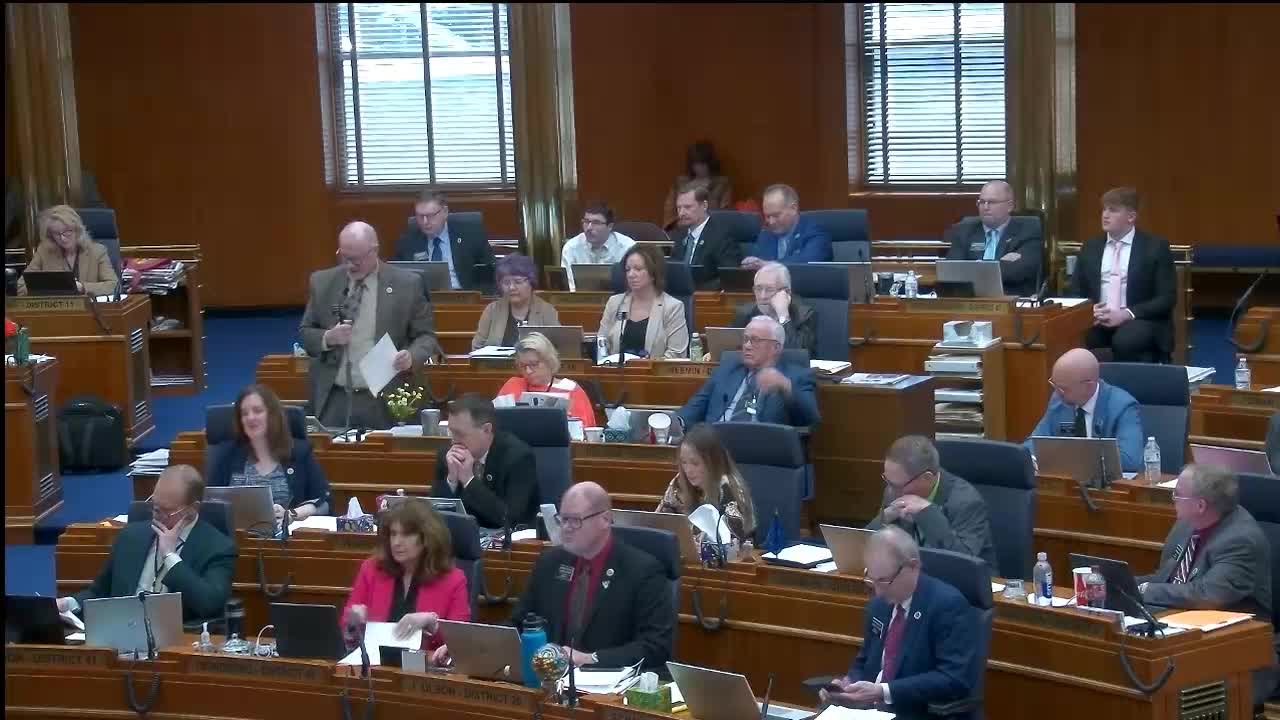House approves bill allowing supplemental feeding for hunting; amendments on setbacks and reporting fail
Get AI-powered insights, summaries, and transcripts
Subscribe
Summary
The North Dakota House of Representatives passed Senate Bill 21-37 on April 14, 2025, changing rules on supplemental feeding (baiting) during hunting by a final vote of 56-34.
The North Dakota House of Representatives passed Senate Bill 21-37 on April 14, 2025, changing the state's rules on supplemental feed used during hunting and sending the measure to enrollment after a 56-34 final roll-call vote.
Supporters said the bill restores landowners’ ability to use supplemental feed while hunting and leaves disease surveillance to the Department of Game and Fish; opponents said the change risks spreading chronic wasting disease and could create disputes between neighbors. The House rejected two amendments that would have limited bait volume and imposed a reporting requirement for wildlife surveillance before approving the underlying bill.
“This is senate bill 2,137 that allows the baiting of deer during hunting season,” Representative Dee Anderson, the bill carrier, told the chamber when debate opened. The measure creates a new section in chapter 20.1-05 of the North Dakota Century Code addressing supplemental feed for hunting and includes a statutory expiration date.
Lawmakers debated two separate amendments that were taken up as Division A and Division B. Division A would have: limited bait to 50 gallons at a single hunting location and required a 50-foot setback from livestock facilities. Division A failed on a roll call, 14 yea, 76 nay. Representative Koppelman argued the amendment “is a private property's rights issue, number 1,” while other members said the setback was needed to protect livestock and reduce neighbor disputes.
Division B would have required continued surveillance and testing for chronic wasting disease by Game and Fish and a report to Legislative Management by Dec. 31, 2028. Division B failed 44 yea, 46 nay after extended debate over the value and timing of a required report. Representative Porter, a member of the Energy and Natural Resources Committee, urged support for Division B, saying, “The report is necessary to give the next ... legislative assembly in 2029 the necessary information to make an informed decision.” Opponents said the department already conducts surveillance and can brief legislators without a statutory reporting deadline.
After the two amendments failed, the House voted on the bill as sent from the Senate. Final passage was 56 yea, 34 nay and the measure was declared passed. The bill as discussed in committee and on the floor creates the statutory change in the hunting chapter and includes a sunset; committee debate referenced an expiration date tied to July 31, 2029.
Lawmakers on both sides described concerns about chronic wasting disease, hunter access and private-property authority. Representative M. Ruby said opponents risk “inserting Game and Fish into landowner disputes” if statutory restrictions were enacted; Representative Porter countered that Game and Fish are the state’s biologists and the agency must continue monitoring herd health while policy changes are under way.
What passed does not include the 50-gallon limit or 50-foot setback in Division A, nor the specific reporting deadline set out in Division B. The House debate repeatedly referenced known chronic wasting disease cases concentrated in western North Dakota and committee history showing long-standing baiting restrictions in some areas; supporters said the bill balances landowner hunting rights and existing wildlife management tools.
The bill will proceed to enrollment and further processing per legislative rules; the text adopted on final passage did not include the Division A or Division B amendments.
Votes at critical points: Division A (limit/setback) — failed 14-76; Division B (surveillance/report) — failed 44-46; final passage — passed 56-34.
The debate included multiple references to the North Dakota Game and Fish Department's existing surveillance program, and members stressed that the change represented a substantial policy shift in how baiting is regulated during hunting seasons.
